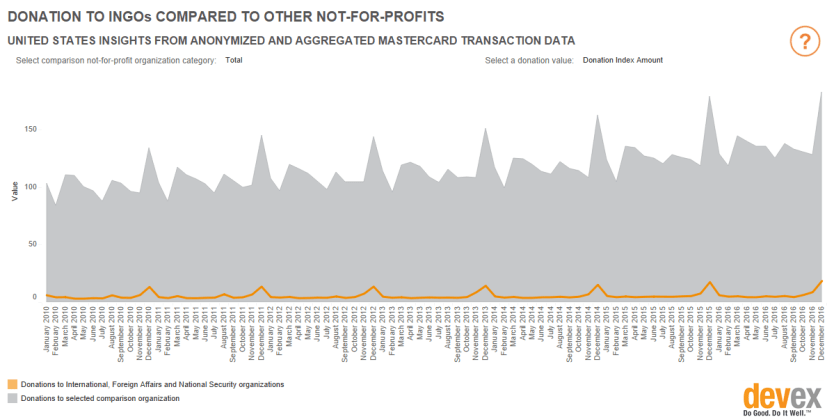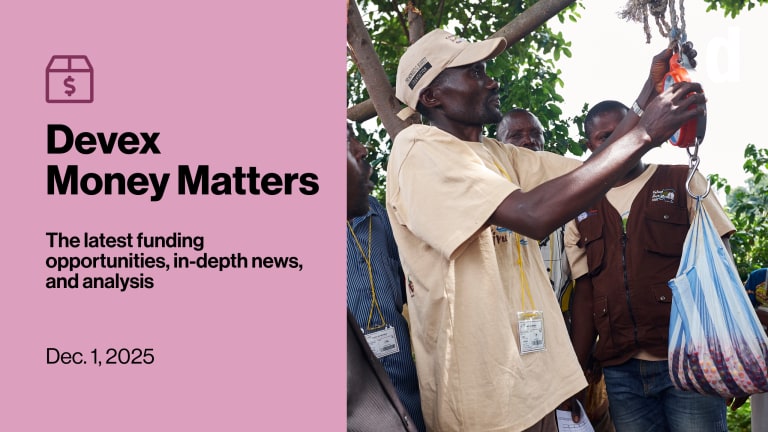
CANBERRA — Shamina Singh, president of the Mastercard Center for Inclusive Growth, wants to change the way companies and staff see their data. Data, she believes, is not just a tool for internal capacity building, but an asset that can be shared with the world.
It is a challenge she has put to Mastercard and they have accepted. The result has seen them pioneering the concept of data philanthropy, making available their data for the benefit of social impact organizations, NGOs, and the global community. And they are challenging other corporations to join them.
To help spread the word about data philanthropy, including services available to NGOs, Singh discussed with Devex Mastercard’s program, gaps in knowledge for NGOs, and lessons for organizations seeking to take a similar data path.
Here is the interview, edited for length and clarity.
Initially, what was the driver to move toward opening data through data philanthropy?
The idea of data philanthropy was driven by the work the company has been doing on financial inclusion. The Center for Inclusive Growth is an independent subsidiary of Mastercard, but we sit inside the company on purpose. What the CEO and board has said is that they really want to make sure the assets of the company are leveraged for social good and social impact.
When we were given the opportunity to look at the assets of the company and figure out strategies to leverage them for social good, it challenged us to go beyond just philanthropy and into new areas.
With corporate philanthropy, the idea is that company’s assets are used for impact. To achieve this, we have to move beyond money.
—And so data philanthropy became the new initiative that the center took on. Primarily, with corporate philanthropy, the idea is that company’s assets are used for impact. To achieve this, we have to move beyond money. Mastercard have shown enormous leadership, saying “let’s think about data for good and social impact.” And that was really the driver for us.
Were there outside influences or inspirations for this new direction?
It sort of came from within, if I am being honest.
We have so many smart data scientists at Mastercard who have an interest in using their brains for good. The initiative first came up through a partnership with DataKind in the United States. They were set up to galvanize data scientists from around the world and plug them into social impact work. And so a number of our Mastercard data scientists signed up to DataKind programs, and this gave us the opportunity to form a much more lasting and strategic partnership between the organizations.
It opened a new conversation about data for good, what it could look like, and who was doing what in this space. It was also around this time that we had the United Nations opening up to data and data initiatives, and companies like Microsoft thinking about data for good.
The need, as a company, to use our data for social good started with our employees and has evolved into something I hope will be much more impactful.
What have been some of the development questions you have been asking — and answering — with your data?
We have a couple elements of data philanthropy we are focused on.
We are trying to figure out if there are uses with anonymized and aggregated data that will not only respect the rules of the road around privacy, but can be used for research.
—One is working with actual Mastercard data and trying to figure out if there are uses with anonymized and aggregated data that will not only respect the rules of the road around privacy, but can be used for research.
We first opened our data for use by Harvard University, who approached us with a proposal to use the data to understand how economies grow, with a specific focus on tourism data and understanding how tourism dollars move in a country. Using Mastercard transaction data, we were able to provide new insights into this area.
There are a number of governments in Asia in particular that focus on tourism as an economic driver: Thailand, Vietnam, and Indonesia, for example. In these countries, tourism is important for direct investment and growth.
How Harvard used our transaction data was quite interesting. It showed the ripple effect a tourist can have when it comes to a country. We can ask, do you actually see inclusive growth occur? Does a tourist spend all their time at a resort, or do they shop at mom and pop stores in the community? Do they travel to secondary cities? And how do they get there? All of this will help governments make judgements around the impact of tourism and what they could be doing to facilitate greater inclusive growth as a result of tourism.
That’s the highest level of usage of data within Mastercard — as data grants.
Read related Devex coverage
► Interactive: Data insights on Mastercard’s data philanthropy program
► Gates, Plan-funded global gender data partnership takes shape
► Can data drive better health outcomes in Tanzania?
► Q&A: How the African Development Bank is improving data quality
The other area of data philanthropy is around data analytics. What we have found is that many social impact organizations or NGOs do not need Mastercard data. At all. Instead, they need to understand their own data, but often don’t have the capacity or resources to help themselves. In those instances, we provide either a grant to hire a data scientist, fund an expert consultant, or provide our own data scientists to build their capacity and ability to learn.
The inspiration for this element of data philanthropy came from our work with an organization called DoSomething.org. They are a very interesting and creative organization in the United States and told us if we could provide analytic support and visualization tools to access data, it would be extremely helpful to their ability to make an impact.
What about internally? How are your data scientists looking for insights?
We started something called the charitable donations insight, and that is something that one of our colleagues is doing where she is using Mastercard data and drawing insights to help nonprofits understand charitable giving.
We asked what a spending poll would look like for not-for-profits and social impact organizations, and insights is the first attempt at that.

It’s a very interesting idea. What she realized is that a lot of the not-for-profits have to raise their own funds, but there is not a lot of science behind potentially where and how they should be doing this. So she thought if she could unlock some of the data around the charitable contributions that we know of, she could offer insights to assist them.
The other thing we did, which was very interesting, was we created a dataset that organizations could pull down if they want to, and mix it with your own data to self-regulate your own work.
We have released two reports so far and organizations have been very receptive to the data. We anticipate more of these similar reports.
What have you found are the weaknesses of your data for supporting insights within developing countries?
In focusing on financial inclusion, we are often focusing on a customer set at the bottom of the pyramid. To gain insights into this group, often it is not transaction data, but data from mobile phone and telecommunications companies that are important in providing insight into data on supporting the bottom part of the pyramid.
Our data can’t do this and it is not an area where we would be using our data. Even for us, the highest contribution we can provide is Mastercard data, but we are finding that is not necessarily what people want. What social impact organization need is analytics, capacity building, and need to understand your own data.
As data philanthropy grows, we will learn more about need. And in some instances this will be data and in others this will be analytics, services, and support. In the end it is about saving time and money, which is the power of analytics.
And we are hoping other organizations will support us down this path.
When the idea of data philanthropy was first discussed, was there any push back or reluctance within Mastercard to open data?

I don’t think it was push back as much as healthy concern. Probably what other companies face, and what we have thought about, is whether we are playing within the rules.
Privacy is paramount.
The concerns expressed would intimidate others from doing this type of work, but we got to the place where we were able to create a data philanthropy governance committee that has all of the right people in Mastercard — including the chief privacy officer, chief technology officer, cybersecurity division, and investor relations. Anybody who has a say — good, bad, or indifferent — is involved in this journey. And the committee is the owner of the whole program.
We have done the right thing to ensure all the right people are engaged at Mastercard. But the big difference is that the board and CEO of the company have said “we are going to do this.” So it’s not a question of if, it’s a question of how. That’s significant.
Establishing a board to have ownership of data strategies is a great idea. For other organization at the start of a data philanthropy journey, what recommendations do you have?
Find other partners. We’re always looking for partners to engage. There are a range of public sector organizations helping private entities to figure this out. DataKind and DoSomething are examples, as well as Stanford University who — through their data center — has been asking about what private organizations need, and need to think about, in supporting public sector data for good initiatives.
Once we get their learnings, this will also be an important resource to help both ourselves and other organizations with the development and roadmap of their data strategies.
To achieve the Sustainable Development Goals and 2030 agenda, what impact can and should private sector data play?
The Sustainable Development Goals provide an important opportunity for everyone to plug in to alleviate or eradicate poverty by 2030.
There is more and more divide coming up between the data haves and the have nots.
—We have been very involved — both in the formation and implementation — to the point that we see financial inclusion as an important mechanism for all of the SDGs to be successful. We have worked closely with the United States government when they were negotiating the SDGs and also with the United Nations.
When you talk about the SDGs, you are really talking about a new global compact for humanity. Private sector, and certainly Mastercard, is very concerned about and is determined to ensure we meet the 2030 targets.
Income and equality are among the biggest issue of our generation. If we don’t tackle the need for information surrounding this, we are going to be in a much worse situation in the near future. With all of this coming up with AI and more, there is more and more divide coming up between the data haves and the have nots.
I think it is incumbent upon private sector entities, working in close cooperation with public sector entities, to really figure this thing out.
To see the potential of Mastercard’s data philanthropy program, interact with their United States donations insights data through Devex’s new interactive feature.








